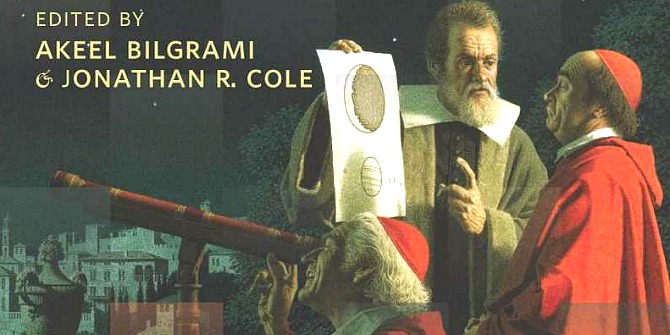For Marx, technology exemplifies the interaction between human beings and nature. Marx’s description of this interaction is in transition throughout his works. An older, humanist and vitalist paradigm sets the human being against nature as a qualitatively different type of force. A newer, thermodynamic paradigm sets the human being and nature in continuity. Amy E. Wendling offers a conceptual history of alienation as it developed in modern thought and in Marx’s own work. Reviewer Richard Cotter is impressed by the author’s style which he finds acts as a steady hand through this fairly complex theoretical territory.
 Karl Marx on Technology and Alienation. Amy E. Wendling. Palgrave Macmillan. 2011.
Karl Marx on Technology and Alienation. Amy E. Wendling. Palgrave Macmillan. 2011.
There are a ‘thousand Marxisms’ said the late Marxist scholar Daniel Bensaid referring to the numerous and diverse interpretations this oeuvre has seen (and suffered) throughout its history. However, far from being a weakness, Bensaid insisted this was a practical strength. Marx’s thought is sustained and revivified by evolving interpretations even if inevitably this comes with a fair dose of disagreement. Then again, disagreement tends to keep ideas alive rather than destroy them. It can be more illuminating to ask why a certain body of thought relays so reliably from one generation to the next: mightn’t this mean that something important has been said that bears repeating? Although it is far from decreed that only ‘good’ ideas will survive through time (whatever these would be), there is surely a significant reason why the secondary literature on Marx is the ‘biggest secondary literature on any subject in the world’.
Arriving on the back of a something of a comeback for Marxism – one recently covered here on this site – Amy Wendling’s book contributes to this vast hermeneutic continent by focusing on the two related themes of technology and alienation in Marx. Wendling is a philosopher at Creighton University, so her analysis is conceptual in character. This makes for dense reading at times but any potential for getting truly bogged down is sidestepped by Wendling’s deft writing which spins the reader’s wheels where necessary.
Unlike much of the workmanlike prose of contemporary Marxist analysis, Wendling is never less than lucid. Hence, early on in the book we read Marx described as “…both the last flower of the enlightenment as well as its most trenchant critic” (12). Elsewhere during a section on capitalism’s ‘logic of exhaustion’ we learn something about the phenomenology of alienation for workers today, who subsist under the existential pressure of “…limitless self-transformation [as the] goal of capitalist personhood” (111). Wendling’s style is a steady hand through some fairly complex theoretical territory.
Wendling’s main goal is to chart the changes in Marx’s thinking on technology and alienation showing how these were affected by the debates of his time, in particular the scientific ones. She uses Marx’s ideas to press her own emancipatory ideal of human activity which need not be “…reducible to and encompassed by labour” (10). Wendling works through Marx, providing a detailed picture of a compelling and above all historically situated thinker who interacted with the ideas of his time and was prepared to abandon or recast parts of his system for the sake of the whole. This is the dialectical way of course and it shows that Marx never completely abandoned this Hegelian methodology even as he critiqued and – as he thought – improved upon it.
Marx was never less than forceful on the page but he could also be ambiguous. Like others such as Alvin Gouldner, Wendling spies a double aspect in his writings: the positivist (quipped Adorno) who searched for material, lawful determinisms and the philosopher who never quite lost the ideal of critique (and so, his idealism), even when encased in the deepest chamber of his avowed scientific materialism. This ambiguity can make it look like he abandoned the concept of alienation altogether but as Wendling explains, it is buried rather than made to disappear completely. Gone ‘underground’ as Robert C. Tucker said.
Inheriting the concept from Hegel and filtering it through others such as Aristotle and Rousseau, Wendling documents how Marx linked the notion to the increasing technicization of his day. Marx was prescient about how technology would transform work and not necessarily for the better. At least not under capitalism that is: Marx was no luddite. He would have rejected the suggestion that society at large should not benefit from scientific advances even if these were generated for, and from within, a socio-economic system he wanted to see dismantled. No raging against the machine for Marx; more raging against the system which would pit machine against human in an exploitative rather than beneficial relation.
As Wendling discusses, the ‘machine fetishism’ endowed by the capitalist mode of production comes to symbolize the fundamental separation of human beings from the potentially actualizing nature of labour itself. What work could and should be according to Marx, it is not allowed to be under capitalism. This normative vision is blocked by a further series of related fetishisms, the most important of which is ‘commodity fetishism’ which magically invests things (products) with the power to control human affairs and skew human relations themselves. This spell is cast says Wendling, to the ideological tune of a “productivist metaphysic” (60) which dictates how value itself is to be construed and helps to alienate humans from their labour.
Then Marx changes his mind. Heavily influenced by the emerging science of thermodynamics which saw human beings as continuous with, rather than apart from nature, an ‘energeticist’ notion of labour is ushered in which Marx aligns with; most determinedly in Capital. This change in turn seems to revise his views on other aspects of his thought, like revolution. Will this now come about through political agency or will it come instead inevitably, through the crisis-ridden passage of time as he now predicts? Its not always easy to tell with Marx, as Wendling repeatedly reminds us.
Ultimately I think Wendling sees one Marx; her Marx; one of a thousand. It’s a Marx which is well worth reading however and this is an engaging and thought-provoking book with much to say to our own times. I was surprised, however, there was no reference to Richard Schacht’s 1970 book Alienation. This earlier comprehensive treatment of the topic contains a thorough chapter on Marx seems relevant to much of Wendling’s discussion. That small observation aside, this book can be highly recommended to advanced students or scholars across a range of disciplines. Beginners are encouraged to look elsewhere to one of the fine introductions available. An excellent place to start is here with David Harvey’s online lectures.
——————————————————————
Richard Cotter is a Ph.D. candidate at the National University of Ireland Maynooth. His research focuses on understanding how reflexive approaches to management learning fare in the workplace context. Richard also works full time as a Human Resource Development Manager for a global financial services firm. Read reviews by Richard.








Great review and nice to see Bensaid’s remarks again about a thousand marxisms. Saw a David Harvey clip once where he mentions giving his seminar on Capital at John Hopkins in Baltimore (I think!) and the literature students, who were being taught by Derrida at the time, read it in a completely different way that he had been accustomed to.